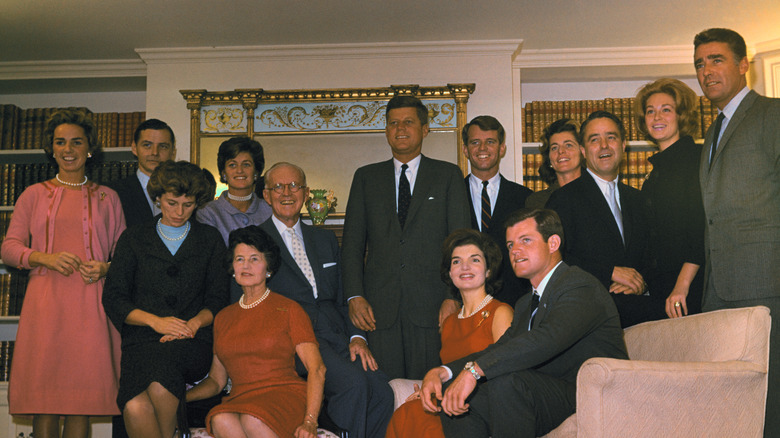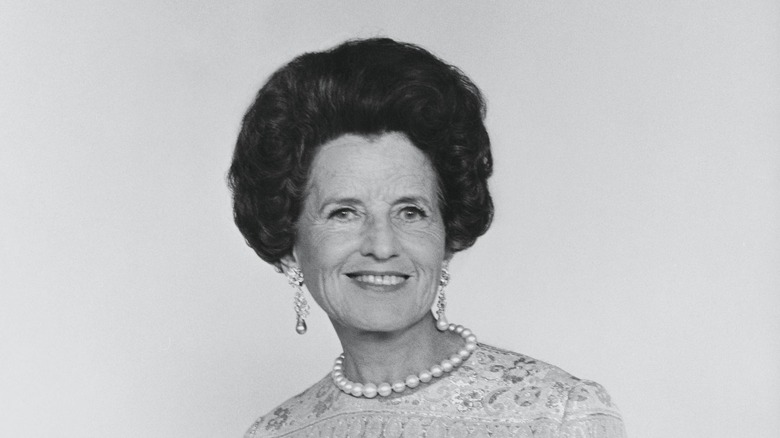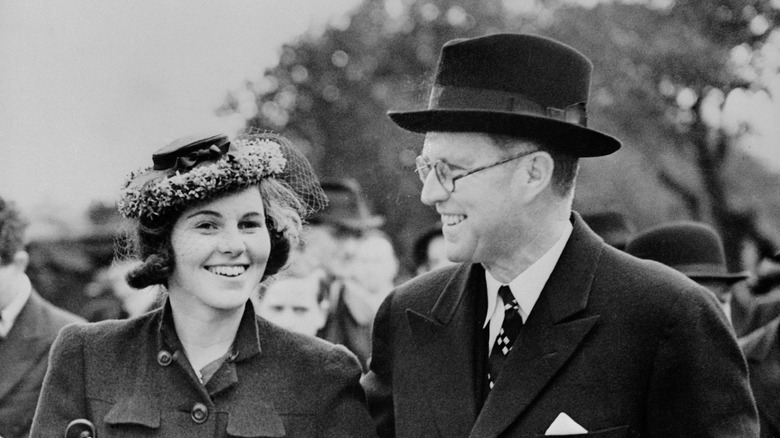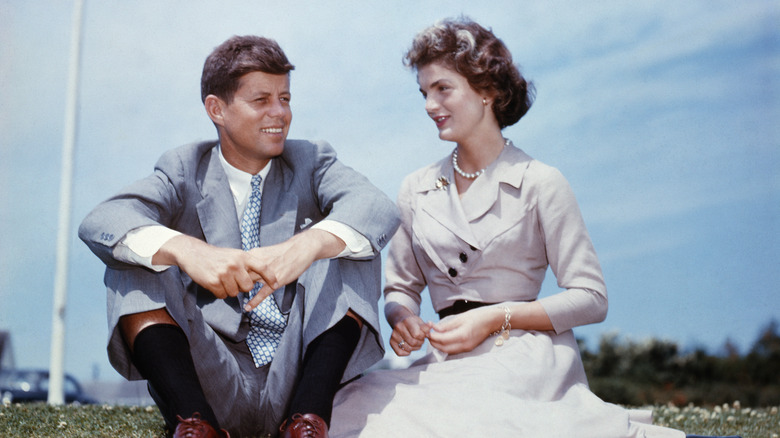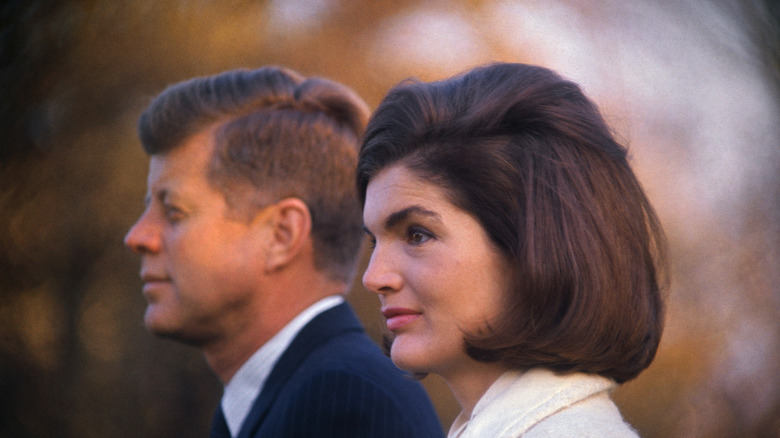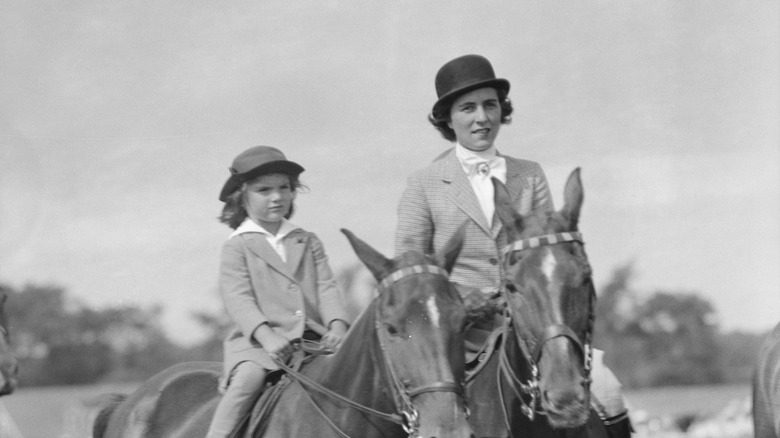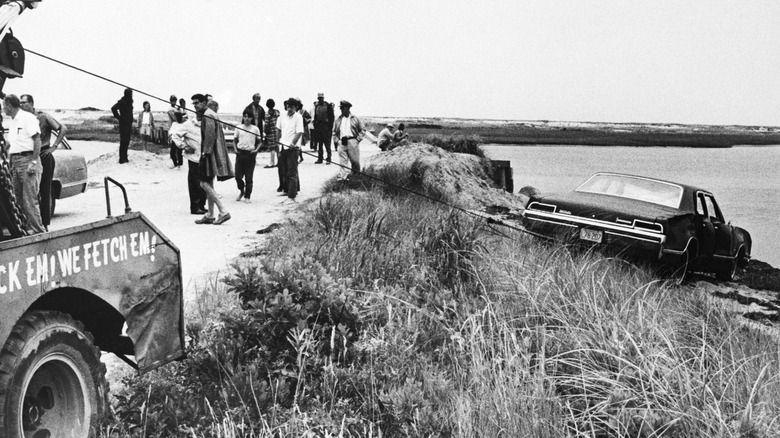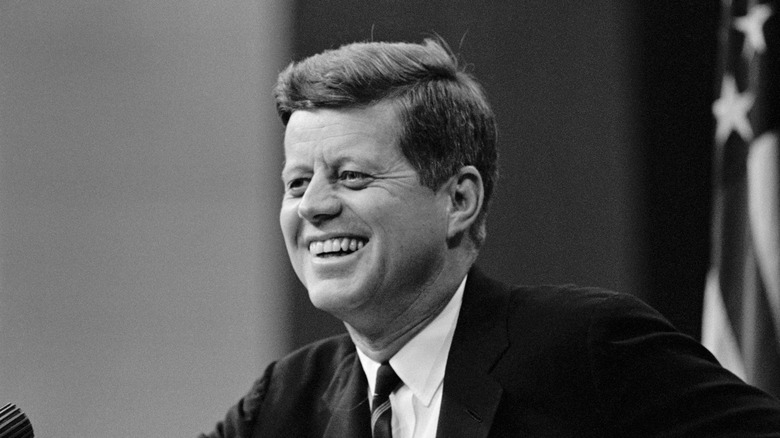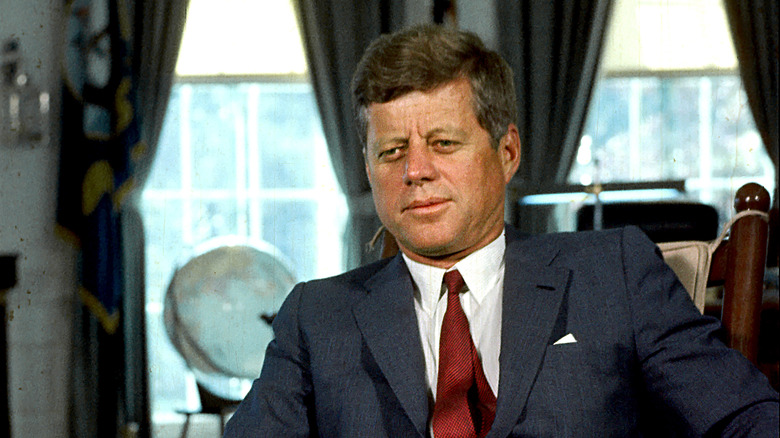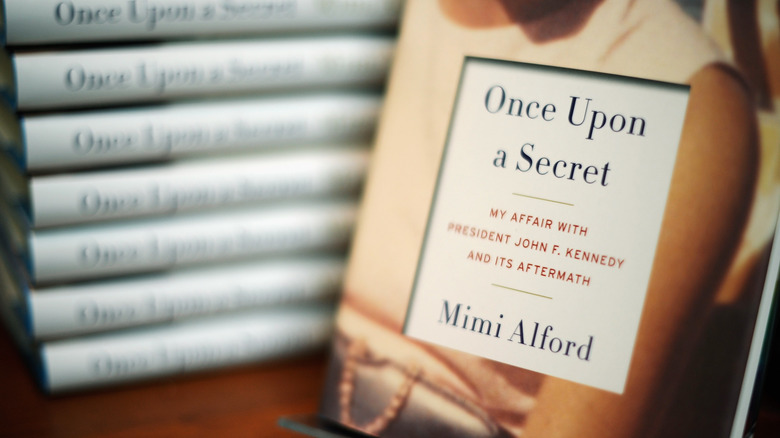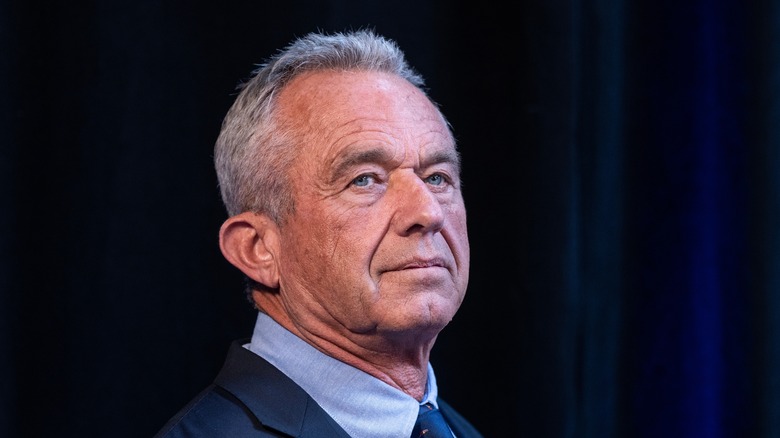Secrets The Kennedy Family Tried To Hide
The modern media landscape can make it seem as if there are no secrets anymore. We know seemingly everything about public figures, especially if they have designs on U.S. politics and the White House in particular. But that public scrutiny can be patchy, especially when you go before the 24-hour news cycle and the internet. Just ask the Kennedys.
The Kennedys we know today got their start with Joseph Kennedy, who rose to prominence as a businessman and diplomat in the early decades of the 20th century. Joe Kennedy proved to be rather savvy — or cutthroat, depending on who you asked — setting himself up as the scion of a growing political dynasty. Not only did son John (popularly known as JFK) become the 35th President of the United States in 1961, but he was previously a U.S. representative and senator for Massachusetts. His brother Robert (RFK) was JFK's attorney general and later a senator in his own right, while youngest brother Edward (Ted) was a U.S. senator from 1962 until his death in 2009. Other members of the family have sought and sometimes won political office, too.
Of course, not all aspects of the Kennedy story are so laudable. Besides the purported Kennedy family curse that has taken the lives of many members, the family has tried to hide all manner of unsavory things over the decades. From philandering husbands to deadly accidents, these are some of the biggest secrets the Kennedys have attempted to conceal.
Rose Kennedy instructed her own daughters to ignore affairs
Rose Fitzgerald was once in love, or so she reported. The daughter of Boston's mayor, she was an intelligent and highly religious young woman who met Joseph Kennedy when she was just 17 years old. Rose's father was reluctant to sign off on his young daughter's wedding, but the two young people continued to meet and eventually wed seven years later, in October 1914.
Though the Kennedys would go on to have nine children together, Joe proved to be far less than a faithful, adoring husband. Indeed, he was markedly unbothered about concealing his extramarital activities (which reportedly included at least two Hollywood icons), leaving Rose to do the lion's share of covering things up. That concealment generally took the form of not saying anything about her husband's infidelities and doing her best to ignore his philandering. To that end, she reportedly told her daughters to do the same, accepting and ignoring what was framed as the inevitable unfaithfulness that would appear in their own marriages. Yet, some accounts indicate that Rose had a distant relationship with her children (JFK once privately admitted that he couldn't remember his mother ever saying she loved him). Others recall that she often spent time alone, hinting that her strategy of ignoring the awkward parts of life as a Kennedy didn't always produce lovely results.
Many simply stopped talking about Rosemary after her lobotomy
When she was born, Rosemary Kennedy may have seemed like a standard baby. Yet, the details of her 1918 birth contain hints that something was wrong. Mother Rose's doctor was unable to get to the Kennedy's Brookline, Massachusetts, home to assist with the birth. A midwife allegedly told Rose to delay pushing for two hours, which may have led to oxygen deprivation and Rosemary's subsequent developmental delays.
The Kennedys included Rosemary in their many activities, including a 1938 presentation to British monarchs King George VI and Queen Elizabeth. But, with their family politically ascendant, Rosemary's intellectual delays and sometimes violent behavioral issues were understood to be serious liabilities. Would people elect a Kennedy if they knew of Rosemary, who made the family look as if they contained a hidden genetic flaw? Even decades later, mother Rose would only vaguely mention her daughter's condition, telling an interviewer, "Rosemary's mind is gone completely. That was due to an accident, which I don't really discuss" (via IrishCentral).
That so-called accident happened in 1941, when Joseph Kennedy arranged for his daughter to receive a lobotomy. He did not seek Rose's permission. The surgical procedure, which effectively cut off communication between Rosemary's frontal lobe and the rest of her brain, was meant to make her more tractable. Instead, it stole 23-year-old Rosemary's ability to walk or communicate. Until her 2005 death, she was confined to institutions and largely ignored by her family until her final years.
Jackie Kennedy reportedly considered divorce
When Jacqueline Bouvier married John F. Kennedy in September 1953, accounts from within the Kennedy family, glowing press coverage, and the attention of thousands made it seem as if it were the culmination of a fairy tale. But the reality was complicated. Numerous accounts indicate that not only was JFK routinely unfaithful to his wife, but that Jackie was keenly aware of it and assumed it could be no other way. Both the Bouvier and Kennedy families came from highly social and powerful circles where a husband's infidelity was almost a given.
In this world, it was oftentimes deemed better to maintain privacy and dignity. Some allege that Jackie certainly loved her husband — with whom she had four children — and did much to advance his political career not just out of duty, but affection and admiration. Others suggest that they stayed together because of the growing power of the Kennedy name.
Yet, while public perception of the couple could get starry-eyed, reports indicate that Jackie was hardly content. Author J. Randy Taraborrelli told People that she considered divorcing JFK on at least two occasions — including when JFK stayed away after she suffered a traumatic stillbirth — but was dissuaded by her own family. Another decidedly unconfirmed rumor maintains that Joe Kennedy offered Jackie a $1 million bribe to stay, with Jackie purportedly replying that the amount would have to hit $20 million if JFK brought home a sexually transmitted infection from one of his mistresses.
Jackie Kennedy faced undiscussed mental health issues
Though she presented a highly controlled image to the public, in private Jacqueline Kennedy experienced serious mental health issues. You can hardly blame her: She tolerated her husband's many infidelities, tried to maintain some sense of normalcy for her children while becoming one of the most scrutinized women in the nation, and underwent the intense trauma of her husband's assassination — while she was sitting next to him.
In 2014, biographers Danforth Prince and Darwin Porter wrote in "Jacqueline Kennedy Onassis: A Life Beyond Her Wildest Dreams," that two miscarriages and a subsequent bout with depression earned Jackie a trip to a mental health facility, courtesy of her husband. There, she reportedly underwent nightmarish electroshock therapy. When she was driven home by a friend, Jackie found an empty house, devoid of JFK, friends, or any other support. The story of her time at this clinic was reportedly suppressed on multiple subsequent occasions because it was deemed embarrassing to the powerful Kennedy dynasty. However, it's worth noting that some have critiqued Prince and Porter for rather shaky sourcing that fails to name interviewees, so skepticism may be warranted.
What is clearer is the fact that Jackie endured great hardship in the aftermath of her husband's assassination. Today, it's likely that she would have been diagnosed with post-traumatic stress disorder, but at the time her nightmares, increased drinking, scattered thoughts, insomnia, bursts of anger, and other symptoms were more generally thought of as intense, if little-discussed grief.
The Bouviers attempted to manufacture an aristocratic history
Though Jackie wasn't always linked to the Kennedys, her story is now so inextricably tied to that of her first husband that it's arguably another source of Kennedy secrets. And what a source it is, assuming you take an unsparing look at her family tree.
While many people would argue that descent from immigrants and working-class folks is nothing to be ashamed of, that wasn't the source of social capital in the world of the Kennedys. Perhaps that's why Jackie's paternal family, the Bouviers, engaged in some creative genealogy. Her grandfather, Major John Vernou Bouvier Jr., published a 1940 family history titled "Our Forebears," where he claimed the Bouviers were descended from a line of French aristocrats. Yet, it appears he got his Bouviers mixed up. The family's true progenitors, also named Bouvier, were working-class businesspeople. When ancestor Michel Bouvier made it to Philadelphia in 1815, he at least made good money as an importer and cabinetmaker, bringing cash if not ancient prestige to the family name.
Meanwhile, members of Jackie's maternal line, the Lees, reportedly claimed they came from the high-class Lees of Virginia. They were actually descended from later Irish immigrants. Later on, as the press made the Bouvier-Kennedy marriage seem like a union of aristocrats, writer Gore Vidal sniffed, "I mean they were somehow Plantagenets and Tudors — it was just nonsense. They were pretty lowly born" (via "America's Queen: The Life of Jacqueline Kennedy Onassis").
Chappaquiddick was a deadly mistake the Kennedys tried to smooth over
Even today, over 50 years later, the reality of what happened in Ted Kennedy's car on the island of Chappaquiddick, Massachusetts, is muddled. In part, that's because the Kennedy family attempted to keep it all under wraps.
The basic outline of the incident is as follows: on the night of July 18, 1969, Senator Ted Kennedy's car went off the Dike Bridge on Chappaquiddick. Inside was Kennedy and aide Mary Jo Kopechne. Kennedy made it out; Kopechne didn't. She appeared to have survived for some time in the submerged car, though she had died by the time rescuers recovered her remains nine hours after the crash. Other details remain troublingly vague. Kennedy claimed that he attempted to save Kopechne, diving over and over into the water. Yet he later returned to his nearby hotel and failed to report the accident. Was anyone else in the car? Was Kennedy intoxicated? Did he suffer from a concussion that contributed to his odd behavior?
Because Kennedy didn't contact authorities until 10:00 a.m. the next day, there was no way to test his blood alcohol level at the time of the accident. So, he was only charged with leaving the scene of the accident, received a two-month suspended sentence, and was banned from driving for a short time. And though the accident effectively ended his presidential ambitions, public support for him actually grew thanks to the efforts of the Kennedy legal and public relations teams.
JFK's affairs weren't exactly common knowledge
For people like Rose and Jackie Kennedy, it was understood that their spouse was going to be unfaithful. With a focus on maintaining their own dignity and the image of the family, things simply had to be kept under wraps for the good of the Kennedy name. However, there were occasional slip-ups. While in France, Jackie is said to have rather bluntly introduced White House staffer Priscilla Wear as "the girl that's sleeping with my husband" — to a reporter, no less (via IrishCentral).
Still, many outside of high-flung political circles likely didn't know that JFK and other members of his family were adulterers. Even insiders were rather delicate about the matter, presumably covering themselves if word got out. In a 1964 oral history interview with the JFK Library, family friend Kirk LeMoyne Billings recalled pulling Jackie aside on the night of President Eisenhower's first inaugural ball. "I felt I should prepare her a little bit for what I felt were some of the problems that Jack might have in marrying at thirty-five," Billings said, continuing, "... she was going to have to be very understanding at the beginning, that he had never really settled down with one girl before." He concluded that Jackie had assented, though plausible deniability meant he didn't have to outright admit that JFK was having affairs.
These assignations later came to allegedly include Marilyn Monroe, Marlene Dietrich, the possibly Mob-connected Judith Exner, and White House intern Mimi Alford.
JFK had serious health issues
Though he may have presented himself as a vibrant young president, the truth is that JFK dealt with health issues for many years. Even while still a child, he experienced the first symptoms of what would be lifelong digestive issues, as well as a host of other ailments such as scarlet fever and a duodenal ulcer. His back proved to be so painful that he underwent four back surgeries between 1944 and 1957. But, far from helping him, these procedures introduced even more problems, including bone infections and abscesses. While his spinal issues were debilitating, one more issue was even worse: Addison's disease. This adrenal condition meant that JFK could not produce stress-managing hormones and had a difficult time managing his sodium, potassium, and glucose.
At the time, treatment for adrenal issues included steroids, which may have given JFK osteoporosis and exacerbated his back problems. JFK starts to sound like a walking pharmacy when you consider his many medications, including painkillers, sleeping pills, amphetamines, antibiotics, hormones, and more.
Somehow, Kennedy managed to hide most of this from the public. In fact, he was careful to present himself as physically active. To voters, JFK was a smiling, suntanned young father who established the President's Council on Physical Fitness. Exercise also helped manage some of his symptoms, which further built up his vital image. On occasion, he also outright denied having Addison's disease, such as when then-rival Lyndon Johnson brought it up on the 1960 campaign trail.
Multiple Kennedys have been accused of mistreating women
Some Kennedy secrets center on male members' alleged poor treatment of women. Perhaps most infamously, President Kennedy was less than faithful to and certainly less than supportive of his wife, Jackie. When she gave birth to a stillborn daughter in 1956, JFK may well have been on a yacht with a mistress, as Jackie's friend Carly Simon suggested to NBC News.
But JFK was hardly alone. Author Maureen Callahan told The Guardian that women who proved inconvenient to the family were often dismissed or publicly ridiculed in an attempt to keep up the Kennedy image. These included former White House intern Mimi Beardsley, who wrote a 2011 account of her alleged affair with JFK and who was scorned by some reviewers as a result (though her book sold well). Carolyn Bessette-Kennedy, the wife of JFK Jr., was also often painted as a troubled and unreliable woman who tarnished her husband's image (Bessette's family later sued the Kennedy estate for her and her sister's deaths in the 1999 plane crash that also killed JFK Jr.).
Then, there's William Kennedy Smith, JFK's nephew. In March 1991, he was accused of sexually assaulting a woman at a Kennedy family property in Palm Beach, Florida. In court, Smith argued that the encounter was consensual, while the judge blocked the testimony of three other women who claimed to be victims of similar assaults. Smith was acquitted. A similar 2004 accusation against him was later dismissed as well.
RFK Jr. has allegedly concealed many things
Writing in The Atlantic, author Kurt Anderson alleged that he bought cocaine from a young RFK Jr. while both attended Harvard in the 1970s. Of course, RFK Jr. hasn't admitted as such, and this account doesn't come with much verification. That is, apart from Kennedy's own long-standing admission that he dealt with 14 years of substance use issues, beginning when he was just 15, which included an arrest for heroin possession in the 1980s.
Kennedy's subsequent recovery has undoubtedly inspired many, as do other facts about the man. Yet there are rumors that his family was uneasy about his presidential campaign (not to mention his vaccine skepticism and championing of other conspiracy theories). Yet, in a July 2024 Vanity Fair exclusive, family members were still reluctant to reveal all of RFK Jr.'s secrets. Their vague concerns were seemingly an attempt to maintain the Kennedy name, though some admitted that RFK Jr. often fell prey to his desire for public adoration.
Kennedy himself posted an August 2024 admission on his X (formerly known as Twitter) account that he left the remains of a bear cub in New York City's Central Park in October 2014. RFK Jr. claimed that he had witnessed another car strike the animal upstate. Intending to use the fur and meat, Kennedy retrieved the remains. After a busy day and with a pending flight, he realized the carcass was still in his car. Egged on by drunk friends (Kennedy says he was sober), he dumped it beneath a bush in Central Park. He went nearly 10 years before confessing.
If you or anyone you know needs help with addiction and/or mental health issues, or has been a victim of sexual assault, contact the relevant resources below:
-
The Substance Abuse and Mental Health Services Administration website or contact SAMHSA's National Helpline at 1-800-662-HELP (4357).
-
The Crisis Text Line by texting HOME to 741741, call the National Alliance on Mental Illness helpline at 1-800-950-NAMI (6264), or visit the National Institute of Mental Health website.
-
The Rape, Abuse & Incest National Network website or contact RAINN's National Helpline at 1-800-656-HOPE (4673).
